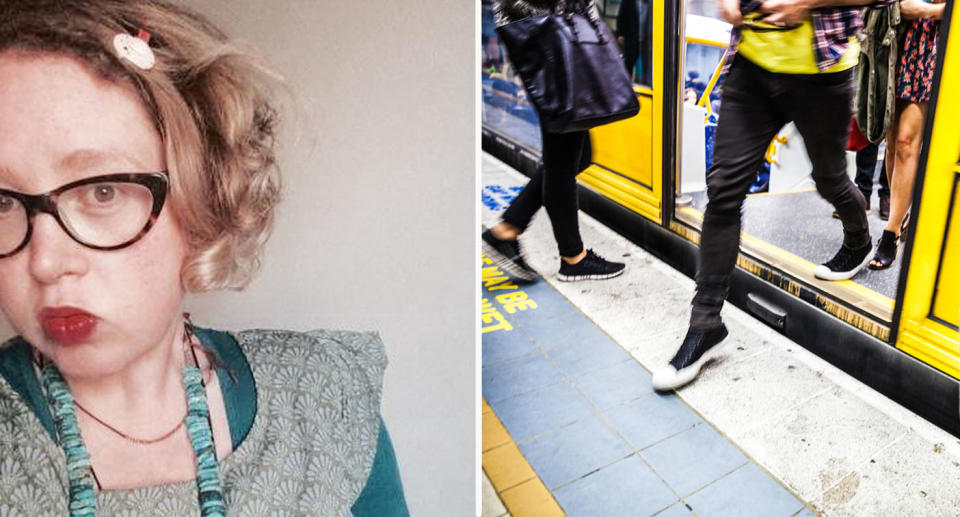Woman's public transport struggle over her 'invisible' disability
For most of us, having to deal with peak-hour crowds is about as bad as public transport gets.
But for a small group of Australians, the same situation can be a painful and emotionally-draining experience.
Those suffering from physical disabilities that aren’t immediately apparent are calling for state governments to introduce a scheme to make it easier for people with an “invisible” disability to access priority seating on trains, trams and buses.
According to the National Disability Insurance Agency 88 per cent of disabilities are “invisible” and many who fall into that category are taking things into their own hands.
Melbourne woman Asher Wolf suffers from Ehlers-Danlos syndrome, which affects collagen that provides support for joints, and finds it difficult to constantly explain to fellow passengers why she needs a seat.
“I’ve had a few experienced where I asked people to move and they haven’t,” she told Yahoo News Australia.

“I’ve asked people to please not push me on the train and they’ve responded really aggressively.
“I don’t want to have to explain my medical condition to a stranger every time I get on public transport.”
The cities of London and Toronto both have official badges issued by transport authorities that read “please offer me a seat” available to anyone with a disability.
In London, the badges became available after a 2016 trial that showed people wearing them were seven times more likely to be offered a seat.
More than 85 per cent of participants said they felt more confident travelling on public transport.
The disability badges followed the success of similar badges for pregnant women and after one enterprising commuter made himself a badge reading “cancer on-board”, so he could secure a seat following treatment appointments.
New York has rolled out a similar system.

Aussies with disabilities making own badges
A Canberra university student who also suffers from Ehlers-Danlos syndrome often has to wait for the next light rail train at peak hour to make sure she gets a seat.
“My ligaments are like elastic bands, my joints tend too dislocate easily” so standing for long periods can be very uncomfortable, she explained to Yahoo News.
She also suffers from postural orthostatic tachycardia syndrome which reduces blood volume when standing up.
Sometime she has a cane with her and notices the “really different” way people treat on her.
She wanted to remain anonymous for this story, but in a recent post on social media site reddit, she lamented the difficulty faced by people with an “invisible” disability.
“Asking people for seats is uncomfortable, and I really wish I didn't have to get stared down because I'm not giving up my priority seat which I need,” the woman wrote.
A stranger who read the post and happened to have a badge making machine offered to make the young woman a small batch “to get things rolling” and has since sent the custom badges to the woman.

Not everyone on board with disability badges
There has been some surveys carried out in Australia about introducing a badge system but they have divided the community, with some fearing the badges would further differentiate them and add to any perceived stigma.
But Ms Wolf thinks they should be available to those who want them.
“I would absolutely put a badge on because it’s far easier,” she said.
“There’s also an element where it’s official and it creates a standard and a norm.”
Ms Wolf believes it’s the quickest and easiest way to change attitudes and make it easier for the disabled to get priority seating.
“The current regime where I have to battle for a change to the status quo, which is appalling right now, is not acceptable,” she said.
Transport Victoria and Transport Canberra have been contacted by Yahoo News Australia for comment.
Do you have a story tip? Email: newsroomau@yahoonews.com.
You can also follow us on Facebook, download the Yahoo News app from iTunes or Google Play and stay up to date with the latest news with Yahoo’s daily newsletter. Sign up here.

 Yahoo Lifestyle
Yahoo Lifestyle 

